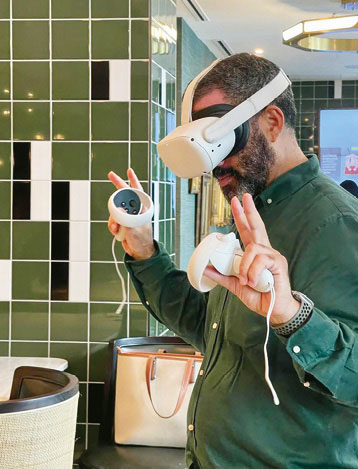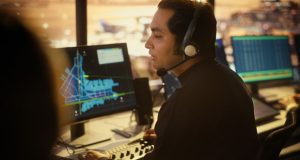Piers Zangana explores the development of new, virtual ways of learning and training which are being applied in the hospitality and facilities management space
Skills and people shortages are the most significant challenges the facilities management and catering sectors are experiencing. In the foodservice and accommodation sector, 118,000 vacancies were recorded between June and August 2023, compared to 92,000 during the same three-month period in 2019.
The way people approach the world of work has also changed, along with the expectations of new generations entering the workplace, and employers will have to adapt and evolve to meet these expectations or risk being left behind.
 For example, 30 per cent of 14-21-year-olds expect training opportunities for skills development in the workplace, according to a white paper commissioned by Umbrella Training, and future generations will also have their own ideas of how training should be delivered and what works for them. Gen Z are the UK’s biggest content consumers, engaging with over 10 hours of online content a day, affecting the ways in which they are familiar with gathering and retaining information.
For example, 30 per cent of 14-21-year-olds expect training opportunities for skills development in the workplace, according to a white paper commissioned by Umbrella Training, and future generations will also have their own ideas of how training should be delivered and what works for them. Gen Z are the UK’s biggest content consumers, engaging with over 10 hours of online content a day, affecting the ways in which they are familiar with gathering and retaining information.
VIRTUAL LEARNING
New, virtual ways of learning and training are also potentially more efficient. Virtual reality (VR), for example, can help businesses upskill their employees faster. Training and apprenticeships provider Umbrella Training, in partnership with Metaverse Learning, recently launched the hospitality industry’s first virtual learning chef courses, targeting Gen Z and A entry-level commis chefs.
“With these programmes, we are addressing a new generation of learners who are more digitally, distanced and flexible learning focused,” says Adele Oxberry, founder, and CEO of Umbrella.
“Their new learning characteristics are more diverse than we have managed before and this is the generation we need to attract into our industry. As educators, we’ve known things must change in order to service our sector in the future. But we must transform ourselves in an effective, sustainable, and scalable way.”
The VR kitchen courses launched so far cover introduction to the kitchen environment, covering everything commis chefs would be expected to know in a real environment.
During development, Umbrella engaged chef professionals and educators to ensure the technical kitchen expertise was accurately and appropriately represented, and all scenarios have been aligned against Level 2 Commis Chef development, whether against the apprenticeship standard, NVQ or diploma.
VR training presents an additional tool to the L&D arsenal, enhancing existing approaches and platforms, particularly appealing to visual and kinetic learners by engaging them with 3D virtual environments.
“Our sector is incredibly hands on and this technology helps to bridge the gap between the needs of our sector and the way in which young people are keen to learn,” says Pete Redman, Chef Director at BM Caterers.
“What a lot of our trainees love about the kitchen is the hands-on, on-the-job learning,” agrees Liam Hatcher, Head of People and Development at Ch&Co.
“Sitting in a classroom environment doesn’t necessarily appeal to all of them, so using VR as part of our training programmes could really help us engage those learners in a new way that works better for them, complementing our existing training schemes.”
The software also analyses the learner’s performance step-by-step, spotting any mistakes or areas where they may need further support that might be missed in a busy educational environment, giving the user real-time feedback, and allowing them to proceed at their own pace, including revisiting topics and stages until they’re comfortable.
FM & VR
It’s an approach being explored in the FM space, not just for the purposes of client sales and operations, but also for training.
“VR allows us to get as close to visualising an environment as possible without the associated risks, which presents so many opportunities in the training space, allowing our trainees to test their skills in realistic and immersive renderings. We can even recreate emergency situations. Effective training in our sector is essential, not only in saving us time and money, but for safety reasons, too,” said Guy Goodall, Director, Polyteck.
While the possibilities of VR in the hospitality and facilities management space could result in significant cost savings, what is key is its potential to provide an engaging and safe new way of training teams. This in turn could aid retention and, critically, attract future generations to sectors that have been struggling to engage future generations and ensure they compete with the likes of tech firms by speaking to young people in their language.
Although it’s too early for any concrete data, the success of this style of approach was seen at Umbrella’s giant technology dome at the Skills London 2022 exhibition, the UK’s largest jobs and careers event for 14-21-year-olds. Umbrella’s space featured Augmented Reality experiences of partner businesses and video games to give an insight into hospitality.
Those who visited the stand voted it the most creative and engaging at the event and hospitality was described as “trendy” by everyone who participated in the activities – a perception the hospitality and facilities management sectors desperately need – and the organisation’s partnership with Metaverse Learning and development of VR training courses was the natural next step on this journey.
Oxberry adds: “For us, as educators and learning and development professionals, I think we need to realise that it is no longer exciting and different to give them videos, 3D models and explorable VR content in our teaching or training. It’s expected.”




